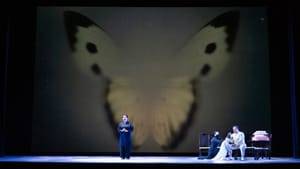Stay in the Loop
BSR publishes on a weekly schedule, with an email newsletter every Wednesday and Thursday morning. There’s no paywall, and subscribing is always free.
A radiant metamorphosis
Opera Philadelphia presents Puccini’s Madame Butterfly

Would Shakespeare’s The Merchant of Venice or Twain’s Huckleberry Finn be improved by eliminating or substituting antisemitic imagery or racial epithets? Can art that depicts unwelcome stereotypes under different cultural circumstances be altered for audiences today without damaging the integrity of the original creation?
The opera community has been wrestling with these questions in recent years, specifically regarding two works by Italian composer Giacomo Puccini (1858-1924). While full of staggering drama and unforgettable melodies, Turandot and Madame Butterfly both exemplify pre-modern Orientalist views and the sexualization and exotification of Asian women, among other issues. But how—if at all—can opera companies address these harmful depictions while honoring the integrity of the composer and the artists who have devoted their lives to interpreting the work?
A thrilling new production
Opera Philadelphia has found a way. The company’s new production of Madame Butterfly is absolutely thrilling, true to its creator and to an impressive roster of singers, musicians, and designers. But at the same time, with skillful artistry and without damage to the score, it has provided a reality check to the prejudices that continue to assault people of Asian descent in the United States and throughout the West. This is a Butterfly that inspires hope and provides encouragement to Asian women and girls, and all people facing marginalization and exploitation.
The plot of Madame Butterfly is well-known and has inspired several other works, including the musical Miss Saigon. In this story, Pinkerton, a rich American Naval officer, “buys” Cio Cio San, a 15-year-old geisha, from a marriage broker in Japan. His stated intent is to enjoy relations with a submissive sexual partner until he is called back to the United States, where he plans to find a “real American wife.” What he doesn’t count on is the loyalty and love that keep Cio Cio San waiting for his return for three years, during which time she raises their son. Her yearning is captured in the aria most associated with this opera, Un bel dì, vedremo. Pinkerton does return, this time with his American wife, Kate, and all Cio Cio San’s dreams are dashed.
More than a doll
Throughout the opera, Pinkerton refers to his Japanese wife as a “doll” and “toy.” Pinkerton eagerly anticipates the pleasures of the bedroom, with reference to the tearing of the butterfly’s wings, the metaphor of entering and taking possession of a house that comes with the wedding contract, and the appearance of an oversized blot of blood on the backdrop as the marriage is consummated off-stage.

There are several techniques applied to this production that have enabled a transformative effect without damaging a creation that ranks among the world’s most popular operas. As might be expected, these vary in effectiveness. The most pervasive is the use of a child-sized puppet especially created by Hua Hua Zhang for this production. The doll is the obsequious, submissive veneer of Cio Cio San. She is either carried by Cio Cio San (soprano Karen Chia-ling Ho) or two black-masked puppeteers. When Pinkerton looks adoringly at Cio Cio San, he looks at the doll, bypassing the real woman (Ho) who stands beside or across the stage from him. The doll conforms to his expectations, bending amorphously to his will. The woman—with real ideas, feelings, and needs—is, to him, invisible.
Another technique is the presentation on the backdrop of a collage of images and information about Asian women of note who overcame prejudice and other obstacles to make major contributions to science, politics, and the arts. This takes place during the interlude before Act III. While it could be seen as a kind of benign filler of questionable effectiveness, overall, the visuals complement the beautiful playing of the Opera Philadelphia orchestra led with skill and emotional connectedness by Corrado Rovaris.
Magnetic music
Music, of course, is what Madame Butterfly is all about. The magnetic personality and extraordinary voice of soprano Ho are unifying factors in telling the story of a child bride betrayed. With the submissiveness of the character conveyed by the puppet, Ho is able to project a Cio Cio San of developing power and emerging self-actualization. This is very different from other takes on this role and allows her to shine as a fully realized human being. In her Un bel dì, vedremo, we can hear both youthful dreams and the first glimpses of the as-yet unleashed powerhouse of determination and resolve that will emerge at the opera’s nontraditional conclusion. What a splendid singer, in her debut appearance with this company, joining many other Asian artists across disciplines.

Anthony Ciaramitaro is an effective foil as Pinkerton, his soaring tenor voice bursting with primal emotions of desire and consequential regret. While not the most fluid of actors, Ciaramitaro filled the Academy of Music with a well-modulated vocalization of the Act III aria, Addio, fiorito asil (Farewell, flowery refuge), and helped make this production a remarkable achievement. Kristen Choi—intelligent and with a clear, compelling mezzo voice as the trusted servant Suzuki—proved a perfect match for Ho in the lyrical "Flower Duet." Anthony Clark Evans was convincing as the ethically torn Consul Sharpless, while the chorus under the direction of Elizabeth Braden gave voice to Puccini’s beautiful choral settings from boxes on either side of the stage.
Highest praise goes to director Ethan Heard for a complex stage production that never flags, and to production designer Yuki Izumihara for translating the beauty of music into visuals that support and advance the plot. Child actor Jayden Wu is appealing and professional as the boy, Trouble.
Shocking and satisfying
The final touch in the metamorphosis of Madame Butterfly is the last scene, familiar to most as Cio Cio San is about to release her son to the departing Pinkertons and sinisterly begins to finger a knife. The opera ends with a twist, shocking in its originality, but also deeply satisfying, with no violence to the spirit of Puccini’s vision. I was on the edge of my seat in the final moments, that suspense being part of what makes this production great.
What, When, Where
Madame Butterfly. Music by Giacomo Puccini, libretto by Luigi Illica and Giuseppe Giacosa; directed by Ethan Heard and conducted by Corrado Rovaris. $25-$285. Through May 5, 2024, at the Academy of Music, 240 S Broad Street, Philadelphia. (215) 732-8400 or operaphila.org.
Accessibility
The performance is sung in Italian with English supertitles. The Academy of Music has wheelchair-accessible seating, seats near the stage for patrons with low vision or blindness, and assistive listening devices. Opera Philadelphia also has Braille and large print programs available. ACCESS tickets are available.
Masks are optional.
Sign up for our newsletter
All of the week's new articles, all in one place. Sign up for the free weekly BSR newsletters, and don't miss a conversation.

 Linda Holt
Linda Holt